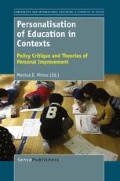Abstract
The main purpose of this research is to refine an understanding of what personalised learning means, in the contexts in which it is being applied today. To do so, it is necessary to take account of both its theoretical and empirical aspects. Theoretical aspects include what has been written in policy documents, such as the UK Department for Education and Skills [DfES] five components of personalised learning, as well as what has been portrayed in scholarship and policy documents at large.
Access this chapter
Tax calculation will be finalised at checkout
Purchases are for personal use only
Preview
Unable to display preview. Download preview PDF.
References
Abe, N. (2007). Lesson of the reform of the educational systems of England: the marketing of education is never good for children. Tokyo: Iwanami Booklet.
Accelerated Learning Systems (2001). What is accelerated learning? Retrieved from: http://www.acceleratedlearning.com/method/what_is.html
ALITE (2005). What is accelerated learning? Retrieved from: http://www.alite.co.uk/about_al/what_is.htm
Baines, E., Blatchford, P., & Kutnick, P. (2003). Changes in grouping practices over primary and secondary school. International Journal of Educational Research, 39(1), 9-34.
Barnard, N. (2005). We're a school not a factory, TES, 29 April, p. 27.
Board of Education (1926). Report of the Consultative Committee on the Education of the Adolescent (Hadow Report). London: HMSO.
Board of Education (1938). Report of the Consultative Committee on Secondary Education with Special Reference to Grammar Schools and Technical High Schools (Spens Report). London: HMSO.
Board of Education (1943). Curriculum and Examinations in Secondary Schools (Norwood Report). London: HMSO.
Boardman, P. (2004). Thinking is fun! Thinking skills simulate enjoyment in the classroom for both teachers and pupils. Teacher Development, 8(2 & 3), 221-232.
Bogdan, R. C., & Biklen, S. K. (1992). Qualitative Research for Education: An Introduction to Theory and Methods. London: Allyn and Bacon.
Campbell, R. J., Kyriakides, L. Muijs, R. D., & Robinson, W. (2004). Effective teaching and values: some implications for research and teacher appraisal. Oxford Review of Education, 30(4), 451-465.
Deane, M., & Tumber, M. (1998). Differentiation: from differentiation to effectiveness. Cheltenham: Mary Glasgow Publications.
Denscombe, M. (2003). The good research guide for small-scale social research projects. Philadelphia: Open University Press.
Department for Education and Skills (DfES) (2004a). A national conversation about personalised learning. Nottingham: DfES.
Department for Education and Skills (DfES) (2004b). Cramlington Community High School — Northumberland. Retrieved from: http://www.standards.dfes.gov.uk/personalisedlearning/downloads/CramlingtonSchool
Department for Education and Skills (DfES) (2004c). Ninestile school, Birmingham — organising the school for personalised learning. Retrieved from: http://www.standards.dfes.gov.uk/personalisedlearning/downloads/Ninestiles_School.doc
Department for Education and Skills (DfES) (2004d). Personalised learning: building a new relationship with schools. Speech by David Miliband, Minister of State for School Standards, North of England Education Conference, Belfast (8th January 2004). Retrieved from: http://www.dfes.gov.uk/speeches/speech.cfm?SpeechID=95
Department for Education and Skills (DfES) (2004e). Seven Kings High School. Redbridge. http://www.standards.dfes.gov.uk/personalisedlearning/downloads/SevenKingsSchool_Sept04.doc Good, T. L., & Brophy, J. E. (1990). Educational psychology: A realistic approach. London: Longman. Guldberg, H. (2004). Class divisions: Who benefits from the 'personalised learning' strategy of dividing school pupils into subsets? Retrieved from: http://www.spiked-online.com/Printable/0000000CA60E.htm
Johnson, M. (2004). Personalised learning: New directions for schools? New Economy, 11(4), 224-228.
Kelly, A. V. (1990). The national curriculum: a critical review. London: Paul Chapman Publishing.
Key Stage 3 National Strategy (2004a). Personalised Learning: features of the five components. Retrieved from http://www.standards.dfes.gov.uk/keystage3/respub/sm_0411mtg
Key Stage 3 National Strategy (2004b). Personalised learning Q&A. Retrieved from: http://www.standards.dfes.gov.uk/keystage3/downloads/sm_0411mtg4personlearn_qa.doc
Kyriacou, C. (2001). Effective teaching in schools. Cheltenham: Nelson Thornes.
McGuinness, C. (2000). ACTS (Activating Children's Thinking Skills): A methodology for enhancing thinking skills across the curriculum (with a focus on knowledge transformation). Paper presented at the ESRC TLRP First Programme Conference, Leicester, United Kingdom, 9-10 November.
Pollard, A., & James, M. (2004). Personalised learning: a commentary by the teaching and learning research programme. London: TLRP & ESRC.
Sanuki, H. (2002). The reform of the educational system of the U.K. as compared with Japan. Tokyo: Koubunken.
Seven Kings High School (2004). Documentation of independent learning. Essex: Seven Kings High School.
Slater, J. (2005). Whither that old personal touch? The Times Educational Supplement, 1 April, p. 2.
Smith, A. (1996). Accelerated Learning in the classroom. Stafford: Network Educational Press.
Tawney, R. H. (1988) Secondary Education for All: A Policy for Labour. With an introduction by J. R. Brooks. London: The Hambledon Press.
TeacherNet (2005). Personalised learning. Retrieved from: http://www.teachernet.gov.uk/educationoverview/briefing/currentstrategy/newrelationship/personalisedlearning/
Walsh, C. (2005). Switch to mixed-age classes. The Times Educational Supplement, 1 April, p. 4
Author information
Authors and Affiliations
Rights and permissions
Copyright information
© 2012 Sense Publishers
About this chapter
Cite this chapter
Courcier, I. (2012). What is Personalised Learning in England? an Investigation of Teacher’s Conceptions. In: Personalisation of Education in Contexts. Comparative and International Education, vol 18. SensePublishers, Rotterdam. https://doi.org/10.1007/978-94-6209-028-6_10
Download citation
DOI: https://doi.org/10.1007/978-94-6209-028-6_10
Publisher Name: SensePublishers, Rotterdam
Online ISBN: 978-94-6209-028-6
eBook Packages: Humanities, Social Sciences and LawEducation (R0)

